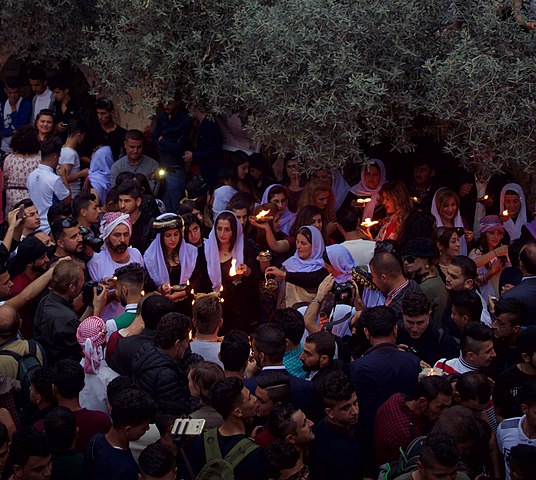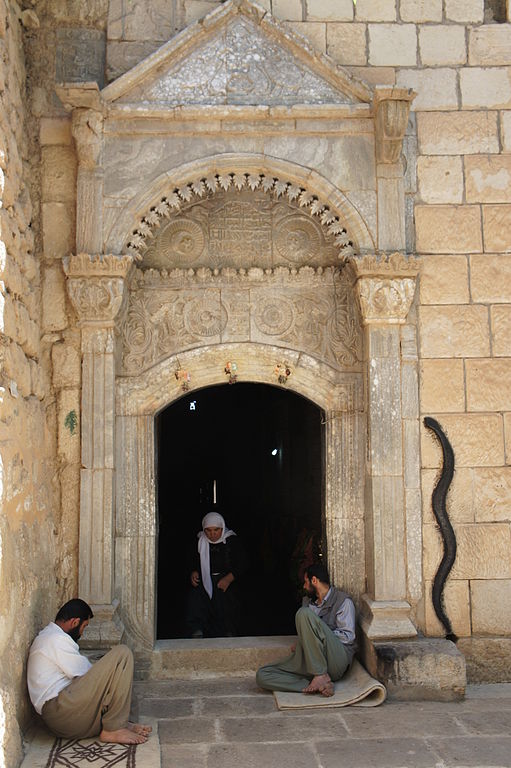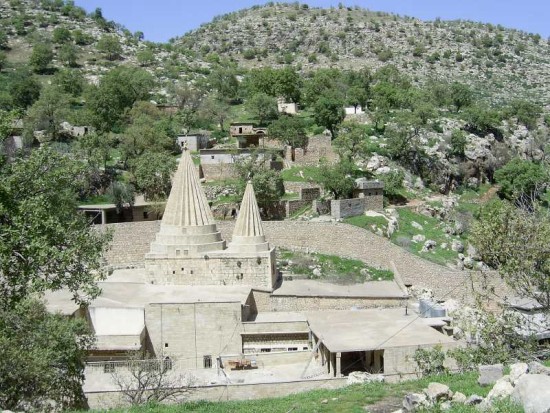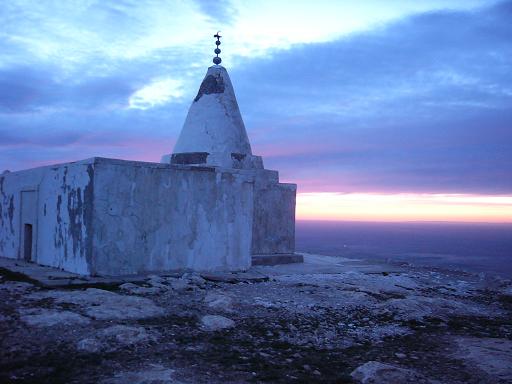
| YAZIDISM Yazidism, Sharfadin, or Dasni (Kurdish: Dasînî, Dasnî) is a monotheistic faith followed by the mostly Kurmanji-speaking Yazidis and based on belief in one God who created the world and entrusted it into the care of seven Holy Beings, known as Angels. Preeminent among these Angels is Tawûsê Melek (also written as "Melek Taus") who is the leader of the Angels and who has authority over the world. Yazidis are called Miletê Tawûsê Melek (the nation of Melek Taus).
Principal
beliefs :
Tawûsê
Melek :
This belief has been linked by some people to Sufi mystical reflections on Iblis, who also refused to prostrate to Adam, despite God's express command to do so. Because of this similarity to the Sufi tradition of Iblis, some followers of other monotheistic religions of the region identify the Peacock Angel with their own unredeemed evil spirit Satan, which has incited centuries of persecution of the Yazidis as "devil worshippers". Persecution of Yazidis has continued in their home communities within the borders of modern Iraq.
Yazidis, however, believe Tawûsê Melek is not a source of evil or wickedness. They consider him to be the leader of the archangels, not a fallen angel.
Yazidis argue that the order to bow to Adam was only a test for Tawûsê Melek, since if God commands anything then it must happen. In other words, God could have made him submit to Adam, but gave Tawûsê Melek the choice as a test: God had directed him not to bow to any other being, and his refusal of the later order to bow to Adam was thus obedience to God's original command.
The Yazidis of Kurdistan have been called many things, most notoriously 'devil-worshippers', a term used both by unsympathetic neighbours and fascinated Westerners. This sensational epithet is not only deeply offensive to the Yazidis themselves, but quite simply wrong. Non-Yazidis have associated Melek Taus with Shaitan (Islamic/Arab name) or Satan, but Yazidis find that offensive and do not actually mention that name.
The Yazidis believe in a divine triad. The original god of the Yazidis is considered to be remote and inactive in relation to his creation, except to contain and bind it together within his essence. His first emanation is Tawûsê Melek, who functions as the ruler of the world. The second hypostasis of this trinity is Sheikh Adi. The third is Sultan Ezid. These are the three hypostases of the one God. The identity of these three is sometimes blurred, with Sheikh Adi considered to be a manifestation of Tawûsê Melek and vice versa. The same also applies to Sultan Ezid. A popular Yazidi story narrates the fall of Tawûsê Melek and his subsequent rejection by humanity, with the exception of the Yazidis.
Seven
Angels :
Reincarnation
:
Creation
myth :
Yazidi accounts of creation differ from those of Judaism, Christianity and Islam, and are closer to those of Zoroastrianism.
Yazidi
holy texts :
Religious
practices :
Temple entry in Lalish Worshipers should turn their face toward the sun. Wednesday is the holy day, and the eve before is also holy.
Festivals
:
One of the most important Yazidi festivals is Îda Êzî ("Feast of Êzî"). Which every year takes place on the first Friday on or after the 14th of December. Before this festival, the Yazidis fast for 3 days, where nothing is eaten from sunrise to sunset. The Îda Êzî festival is celebrated in honor of God and the 3 days of fasting before are also associated with the ever shorter days before the winter solstice, when the sun is less and less visible. With the Îda Êzî festival, the fasting time is ended. The festival is often celebrated with music, food, drinks and dance.
Another important festival is the Tawûsgeran where Qewals and other religious dignitaries visit Yazidi villages, bringing the sinjaq, sacred images of a peacock symbolizing Tawûsê Melek. These are venerated, fees are collected from the pious, sermons are preached and holy water and berat (small stones from Lalish) distributed.
Tomb of Sheikh Adi in Lalish The greatest festival of the year is the Cemaiya ("Feast of the Assembly"), which includes an annual pilgrimage to the tomb of Sheikh Adi (Sêx Adî) in Lalish, northern Iraq. The festival is celebrated from 6 October to 13 October, in honor of Sheikh Adi. It is an important time for cohesion.
If possible, Yazidis make at least one pilgrimage to Lalish during their lifetime, and those living in the region try to attend at least once a year for the Feast of the Assembly in autumn.
Purity and taboos :
The Chel Mera Temple, or "40 Men Temple", on the highest peak of the Sinjar Mountains in northern Iraq. The temple is so old that no one remembers how it came to have that name, but it is believed to derive from the burial of forty men on the mountaintop site.
Many Yazidis consider pork to be prohibited. However, many Yazidis living in Germany began to view this taboo as foreign import from Judaism or Islam and not part of Yazidism, and therefore abandoned this rule.
Too much contact with non-Yazidis is also considered polluting. In the past, Yazidis avoided military service which would have led them to live among Muslims and were forbidden to share such items as cups or razors with outsiders. A resemblance to the external ear may lie behind the taboo against eating head lettuce, whose name koas resembles Yazidi pronunciations of koasasa. Additionally, lettuce grown near Mosul is thought by some Yazidis to be fertilised with human waste, which may contribute to the idea that it is unsuitable for consumption. However, in a BBC interview in April 2010, a senior Yazidi authority stated that ordinary Yazidis may eat what they want, but holy men refrain from certain vegetables (including cabbage) because "they cause gases".
A minority of Yazidis in Armenia and Georgia converted to Christianity, but they are not accepted by the other Yazidis as Yazidis.
Customs
:
Religious
organisation :
There are several religious duties and that are performed by several dignitaries.
Mîr :
The leader of the Yazidi is a hereditary Mîr or prince, and the current emir is Hazim Tahsin or Naif Dawud. Hazim Tahsin is a former deputy in Iraq's Kurdish parliament. The former head was his father, Tahseen Said, who died in January 2019 in Germany, and who was head of the community for nearly 75 years. He is the supreme ruler over the Yazidi. He can expel anyone who opposes to his decisions from the community. The family of the Mîr resides in Ba'adra.
Baba Sheikh :
The Baba Sheikh is the leader of all Sheikhs and the Kocheks. His post is mainly granted hereditary but he is appointed from the Mîr. He is obliged to observe long periods of fasting of 40 days in the summer and winter. The acting Baba Sheikh has to be from the family of the Shemsani Sheiks. He shall not be dismissed, and only be replaced if he dies or abandons the Yazidi faith. The current Sheikh is Khurto Hajji Ismail.
Sheikh :
All Yazidi are obliged to have a Sheikh and a Pîr. A Sheikh can express sermons and impose taboos on his followers (Mîrids).The Sheikh should attends important events like births, deaths and weddings. For this duty they give him a certain annual amount of money. Sheikh has the same signification in Arabic like Pîr in Kurdish.
Pîr :
The Pîrs duties are similar to the ones of a Sheikh, he can attend the majority of the events as well which the Sheikh attends, if the Sheikh is not able to, but he is awarded just about half of the money a Sheikh receives in exchange.
Peshimam :
He is responsible to hold weddings ceremonies and is appointed by the Mîr amongst the family of the Peshimams. Also he can not be dismissed and only be replaced in case of his passing away or him abandoning the Yazidi faith.
Kocheks :
The Kocheks are led by the Baba Sheikh and are the servants to Sheikh Adi. They collect wood and water among other duties they have. They are also known to observe long fasts and to be able to communicate with the "World of the Unseen".
Source :
https://en.wikipedia.org/ |



